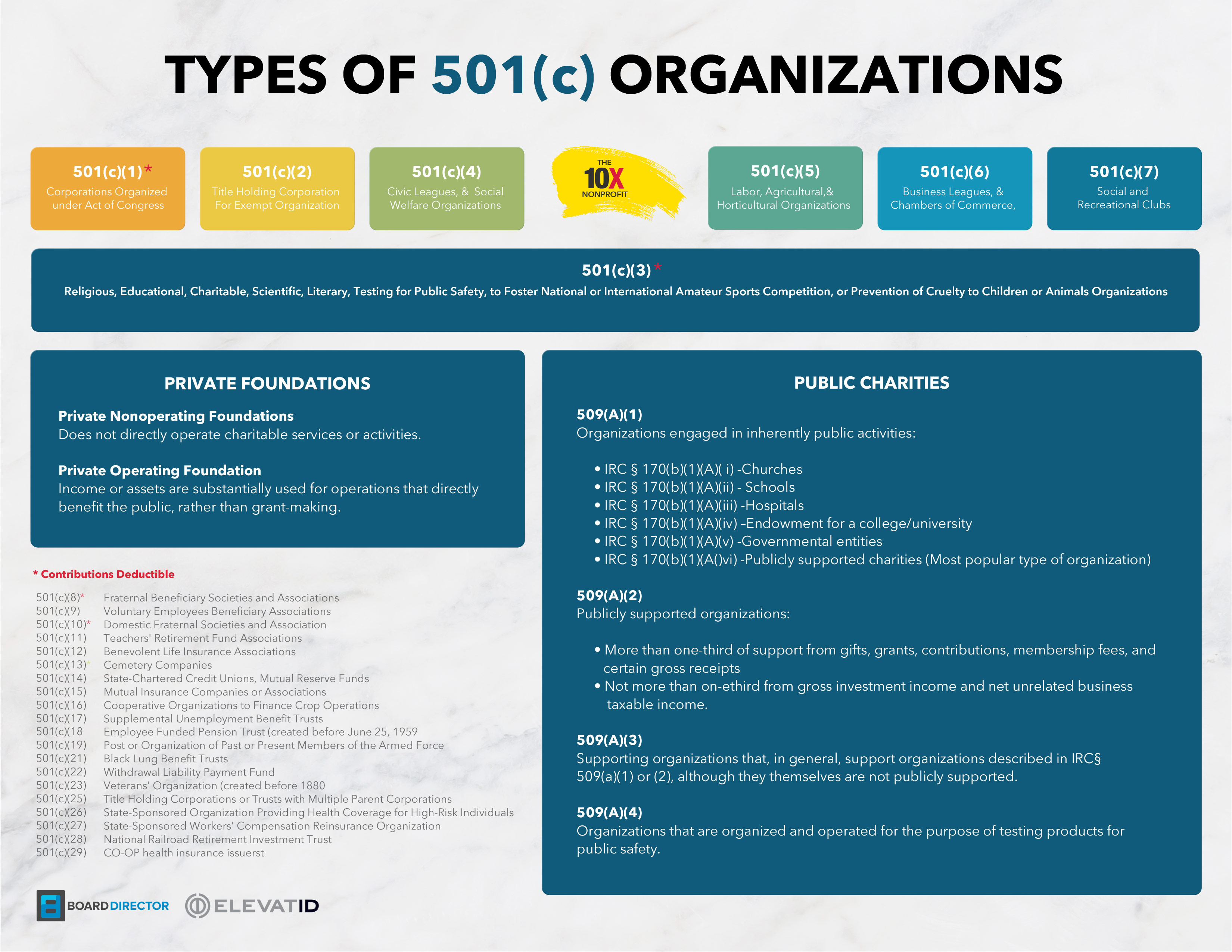A nonprofit organization is a corporation, LLC, unincorporated association, or other legal structure formed for not-for-profit purposes. Its not-for-profit purpose is declared when the legal structure is formed. Obtainment of 501(c)(3) or other tax exemption does NOT define whether the organization is a nonprofit.
A nonprofit organization is an organization that serves the public interest. In general, the purpose of this type of organization must be charitable, educational, scientific, religious or literary. The public expects to be able to make donations to these organizations and deduct these donations from their federal taxes.
A nonprofit organization is exempt from paying federal corporate income tax. While these types of organizations also are often exempt from paying state and local sales tax, property tax and taxes on other assets, this is not always the case as states have different rules.
A nonprofit organization has paid and volunteer staff, but employment taxes and federal and state workplace rules are generally no different than those imposed on for-profit organizations. *A poor practice is pay low salaries. Nonprofit organizations can make a huge difference in how closely it compares to a for-profit business.
A nonprofit organization can have clients, can offer products and services, will need revenue, should market itself, and must be concerned about customer satisfaction whether in those assisted or those who contribute donations in support of operations, programs or services. It is a business that must serve the public interest and it will succeed or fail as any business will, depending on how well it is operated.
The difference between nonprofit and for-profit organizations is that nonprofits do not declare a profit and instead utilizes all revenue available after normal operating expenses in service to the public interest while for-profits distribute their profits to their owners or stockholders.
Nonprofit organizations fall into 7 main categories:
- 501(c)(3) Charitable Religious, and Educational Organizations
- 501(c)(4) Civic leagues and social welfare organizations
- 501(c)(5) Labor/agricultural/horticultural organizations
- 501(c)(6) Business and professional leagues
- 501(c)(7) Social and recreational clubs
- 501(c)(8) Fraternal beneficiary societies
- 501(c)(9) Veterans organizations
Types of Nonprofits
The IRS code allows you to operate as a nonprofit, tax-exempt organization. We recommend having a lawyer and accountant with nonprofit experience advise you on the proper steps to register and operate within government rules.
There are 27 different types of tax-exempt organizations under section 501(c) of the Internal Revenue Code.
1. 501(c)(1) – Corporations organized under the Act of Congress
2. 501(c)(2) – Title-holding companies for exempt organizations
3. 501(c)(3) – Religious, educational, charitable, scientific, literary, testing for public safety, to foster national or international amateur sports competition or prevention of cruelty to children or animals organizations
4. 501(c)(4) – Civic leagues, social welfare organizations, and local associations ofemployees
5. 501(c)(5) – Labor, agricultural and horticultural organizations
6. 501(c)(6) – Business leagues, chambers of commerce, real estate boards, etc.
7. 501(c)(7) – Social and recreational clubs
8. 501(c)(8) – Fraternal beneficiary societies and associations
9. 501(c)(9) – Voluntary employee beneficiary associations
10. 501(c)(10) – Domestic fraternal societies and associations
11. 501(c)(11) – Teacher’s retirement fund associations
12. 501(c)(12) – Benevolent life insurance associations, mutual ditch or irrigation companies, mutual or cooperative telephone companies, etc.
13. 501(c)(13) – Cemetery companies
14. 501(c)(14) – State-chartered credit unions, federal credit unions, and mutual reserve funds
15. 501(c)(15) – Mutual insurance companies or associations
16. 501(c)(16) – Cooperative organizations to finance crop operations
17. 501(c)(17) – Supplemental unemployment benefit trusts
18. 501(c)(18) – Employee funded pension trusts
19. 501(c)(19) – Post or organization of past or present members of the Armed Forces
20. 501(c)(20) – Group legal services organizations
21. 501(c)(21) – Black lung benefit trusts
22. 501(c)(22) – Withdrawal liability payment fund
23. 501(c)(23) – Veterans organizations
24. 501(c)(24) – Section 501(c)(3) Black Lung Benefit Trusts
25. 501(c)(25) – Title-holding corporations for exempt organizations
26. 501(c)(26) – State-sponsored organization providing health coverage for high-risk individuals
27. 501(c)(27) – State-Sponsored Workers’ Compensation Reinsurance Organizations
Remember that each type has specific requirements and qualifications that must be met to maintain tax-exempt status.Click here to add your own text

